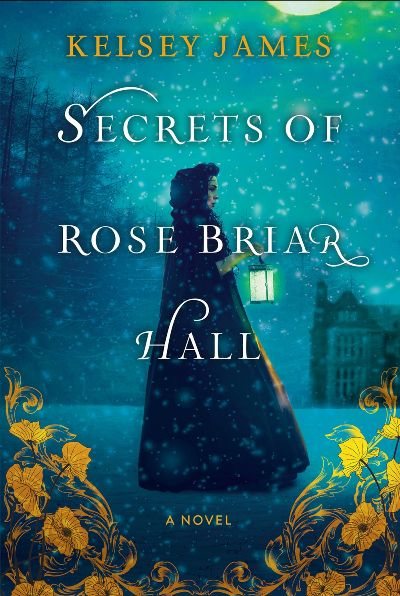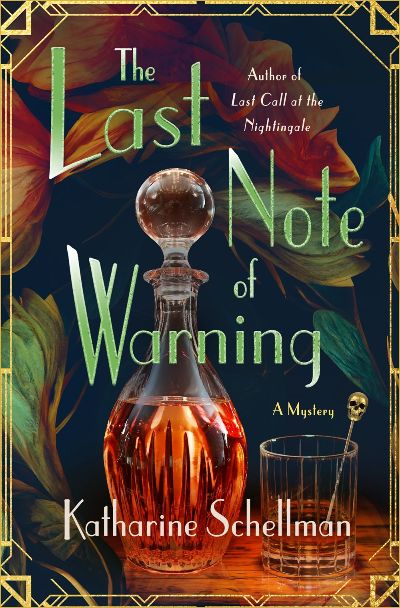A richly depicted, absolutely haunting, and totally compelling novel from the consummate historical crime novelist Rhys Bowen. It’s 1968, and Liz Houghton is writing obituaries when she really wants to be a reporter. The disappearance of a young girl prompts her to go rogue and take on the investigation—with help from her roommate, Marisa, a police detective. Liz finds echoes of 1968 in the disappearance of three girls during World War II, lost while being evacuated to avoid the bombings. She eventually discovers the village of Tydeham, abandoned since it was taken over by the military during the War. Mysteriously drawn to the village—and with the help of a young man she meets there—Liz begins to make connections between what happened in the past and what lives on in the present. Parentage, great country estates, elderly and vulnerable parents, romance, and young women elbowing their way into the professions are all part of the tale. Perfect for book groups, purchase extra copies.
Historical
Spotting a sleek Mercedes SL sports car parked in a sloping field below a house, its engine still running and the driver’s door left open, Denton Wymes, on his way home from fishing, pauses to investigate. It’s a moment that the isolated loner will soon regret as he becomes caught up in a missing-person case that will turn his life upside down. Before Wymes can retreat, a man named Armitage approaches, claiming his wife has thrown herself into the sea. Together they walk up to the house to telephone for help. Armitage’s behavior is odd (“he seemed more excited than distressed’) and Wymes senses that the tenant answering the door, Charles Rudduck, recognizes Armitage. Called in from Dublin to investigate is Detective Inspector St. John (pronounced “Sinjun”) Strafford, who is also juggling a complicated personal life (an estranged wife and a lover who is the daughter of his colleague, state pathologist Quirke). In late 1950s Ireland, divorce is illegal, and Anglo-Irish social tensions remain strong. Banville deftly captures the prejudices and suspicions between the groups. “You’re not a Paddy, then” says Armitage to Wymes, who stiffly corrects him that he is Irish, but not “bog Irish.” In a mostly Catholic police force, Strafford stands out as the rare Protestant. His investigation gradually uncovers secrets that go back years and into previous series installments, but enough back information easily guides new readers through the complex plot. Banville ends his fourth Strafford/Quirke crime novel (after The Lock-Up) on a haunting, ambiguous note. With its complicated, not always likable protagonists, this beautifully written book will appeal to fans of literary mysteries in the vein of Kate Atkinson’s and Tana French’s works.
Harry Hunt, former right hand to Robert Hooke, from whom he’s now estranged, is back in his third 17th-century London mystery, after The Bloodless Boy and The Poison Machine. He’s still immersed in a life of the mind and courting Hooke’’s daughter, Grace. Otherwise, though, his circumstances have changed markedly, with new prosperity sitting increasingly uncomfortably on him as events, and a surprising relationship, remind him where his roots lie. He’s also reminded from whence he came when the King takes him down a peg during an investigation (“Your use to me outweighs your impertinence”). The case starts when Harry attends the planned dissection of the corpse of a suicide from Bethlehem Hospital, the notorious insitution nicknamed Bedlam, which is halted quickly when Harry sees that the cadaver is that of no Bedlam pauper but his neighbor. How her body got to a hospital where she wasn’t a patient is a puzzle. Adding to the horror, another woman shortly goes missing and Harry is charged. He’s soon on the run, offering Lloyd the opportunity to show what London in 1681 was like outside its gilded halls and to keep readers on edge as the law and other malevolent forces close in. With its rich language, gory details of an era that was an attack on the senses, tidbits on Popish vs. Protestant politics, and shocking facts about early medical training, this is another immersive winner from Lloyd.
A wonderful addition to the literature of The Wizard of Oz, this novel focuses on 11-year-old Dorothy Gale, “dreamy, distant, difficult,” and her eventual return to Kansas via a pumpkin field, where she is found sleeping. Poor Dorothy didn’t know the drill—she was insistent on the reality of the fantastic land she had left, with “talking beasts, flying monkeys, and a wizard”—when she should have been accusing the Oz citizenry as being ungodly pagans. But it’s Dorothy’s admission that she murdered (actually melted) the witch, and the discovery that a leading, witch-like townswoman, Alvina, has also been murdered (melted by lye), that sends Dorothy off to the Topeka Insane Asylum. Fortunately for Dorothy, the town is visited by Dr. Evelyn Grace Wilford, a student of William James, who faces the misogyny and Christianity of the townspeople to learn the truth of what really happened to Dorothy Gale. A delight from start to finish.
This sequel to Trussoni’s 2023 The Puzzle Master (my favorite book of all time!) finds savant Mike Brink once more faced with a puzzle that others have found unsolvable. This time his help is requested by the Japanese imperial family, who dispatch another puzzle genius, Sakura Nakamoto, to whisk him from New York to Tokyo. Mike is well known for his work creating puzzles and taking part in competitions in which participants recite the string of numbers that form pi, his synesthesia allowing the numbers to appear “as a scale of color at the edge of his vision.” These are the upsides of the accident that left him an affable genius. But there are drawbacks. He’s so far been unable to form any romantic relationship and struggles to understand himself. So when Sakura tells him that the beautiful Dragon Puzzle Box, a puzzle that’s uber-famous in Mike’s world, is available for him to try, and that it will help him to understand his gift, he jumps at it. This is no ordinary box—others who have tried to open it have had fingers amputated or been poisoned by the puzzle’s booby traps. Work on it takes Mike on thrilling journeys not only to fascinating Japanese locales but further into the recesses of his mind than he thought possible. Engrossed readers will happily make the trips with him. While you’re waiting for this wonderful follow-up, get The Puzzle Master and read our interview with Trussoni when that book was published.
Millie Turner is the envy of 1908 New York. She nabbed the catch of her season, marrying devastatingly handsome financier Charles Turner. They’ve moved to Oyster Bay, Long Island, and live in a house Millie inherited, which is now decorated too ostentatiously for her liking—there’s a taxidermied zebra!—but what Charles wants, Charles gets. Millie is nervously but happily hosting a lavish party when suddenly everything changes—she wakes up to a freezing, dark house, with the party over and the guests gone. Nobody will tell her what ’s happened, but she slowly learns that after a crime was committed at the party, she took a weeks-long “rest cure”—a drug-induced sleep prescribed at her husband’s wishes. Millie has had a terrible upset, they say, and since hysteria “can lead to immoral behavior [and] make you ungovernable,” there’s no time to waste: she must enter an institution. Thus begins Millie’s fight for her life. The first-person narrative, told from the young woman’s point of view, is both shocking and exciting, moving from grand ballrooms to flophouses and from shady business dealings to the honesty of pure love. A lengthy court battle will keep readers deliciously on edge in James’s (The Woman in the Castello, 2023) shocking and gripping drama.
A classic mystery that pulls the reader in and doesn’t let go until there’s a resolution. It’s the mid-1960s, and Franklin Warren arrives in small-town Bethany, Vermont to join the state troopers as a detective. It’s a time of change: as young men head to Canada to escape the draft, the state is developing highways that, many fear, will change Vermont irrevocably, while the echoes of the Cold War continue to reverberate. Warren is also escaping his own demons, a tragic occurrence he left behind in Boston but is unable to forget. But before he can unpack—literally!—he’s called to investigate a fire; Hugh Weber, a hippie farmer, has burnt down his barn and likely killed himself, although evidence of suicide is scant. Warren digs deep into the community, from Weber’s widow to Warren’s elderly next-door-neighbor, a retired intelligence agent. Secrets abound, but which one will unveil the murderer? Fans of Kay Jennings and Jeff Carson will appreciate this new series by the author of The Drowning Sea.
Fans of Schellman’s previous two books in this exciting series, Last Call at the Nightingale (2022) and The Last Drop of Hemlock (2023), will find this trilogy closer a satisfying end to the roller coaster of Vivian Kelly’s life as a seamstress by day, flapper at a queer-friendly speakeasy by night. Vivian now delivers dresses to her boss’s wealthy clients, waiting around mansions until the clients deign to join her for a last check on their new dresses’ fit. On one such visit, Vivian is invited by the gentleman of the house to sit a while and warm up, during which time he’s called away. She then finds him dead, and as she’s the only person around, she’s on the hook for the killing. She’s given a week to find the real killer, with the police seemingly aware that she probably didn’t do the crime but happy to have a handy suspect to charge. The tumultuous week forms the bulk of the book, and sees our hero display her signature moxie, smarts, and the love she hides for her family and her police-officer paramour, their relationship troubled by his family ties to the commissioner who’s happy to put Vivian away. Life among the haves and have nots of the Roaring Twenties is a heady setting and Vivian a character well worth getting to know—you can enjoy this without having read the previous two books, but do yourself a favor and add them to your library’s hold list anyway!
Dugoni (One Last Kill, Her Deadly Game) takes a detour into Seattle’s past in his latest legal thriller. In 1933, in a world worried about the rise of a German Chancellor named Adolf Hitler and the United States feeling the crunch of the Great Depression, a young man named William “Shoe” Shumacher leaves home to take a position at one of Seattle’s newspapers. Shoe receives assistance from a homicide detective and is given special access to a murder at a social club. A former boxer named Frankie Ray is killed by the club owner, George Miller, who claims self-defense. Shoe begins to suspect there is more to the story as he writes his daily updates for the Seattle Daily Star. Dugoni juggles a compelling crime story with a sweet romantic tale as Shoe falls for a young woman who works at a bakery, and they begin to fall in love, even as he spends every day in the courtroom watching the case unfold. The case is compelling, the characters are stellar, and the prose takes the reader back to a time when DNA and technology were not available to make a slam-dunk prosecution. Is it too early to say that this will be remembered as the best legal thriller of the year?
Berry’s talent for mixing nonstop action with history is in full swing in his latest. Cotton receives what seems like a simple assignment: protect a woman named Kelly Austin. When he rescues her from a kidnapping attempt, he learns that Kelly is not her real name, and before plastic surgery that was necessary due to an accident, she had a torrid past with Cotton. The truth of her background and why she is being hunted will separately take Cotton and his lady love, Cassiopeia, on a global chase that will make them unable to trust anyone but themselves. How does the creation of cryptocurrency tie in with the plundering of a vast treasure by Japan near the end of WWII? The answers will surprise and even shock even die-hard Berry fans. The truth of the Atlas Maneuver, if it comes to pass, will change the world’s economic future forever. One of the best features of Berry’s novels is the writer’s note, in which he breaks down the facts behind the fiction, and it’s essential reading since everything in this thriller seems all too real. Whether you are a long-time reader of Cotton’s adventures or a newcomer, this book is terrific.










